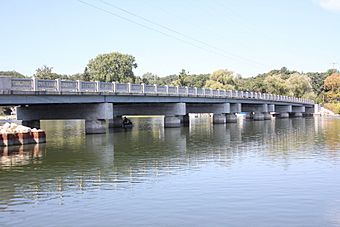Fruitport Road–Pettys Bayou Bridge facts for kids
Quick facts for kids |
|
|
Fruitport Road–Pettys Bayou Bridge
|
|
 |
|
| Location | Fruitport Rd. over Pettys Bayou, Spring Lake Township, Michigan |
|---|---|
| Area | less than one acre |
| Built | 1948 |
| Built by | L.W. Lamb |
| Architect | Michigan State Highway Department |
| Architectural style | steel stringer |
| MPS | Highway Bridges of Michigan MPS |
| NRHP reference No. | 99001535 |
| Added to NRHP | December 17, 1999 |
The Fruitport Road–Pettys Bayou Bridge, often called the Bowen Bridge, is an important bridge in Spring Lake Township, Michigan. It carries Fruitport Road over Petty's Bayou, which is part of Spring Lake. This bridge helps people travel easily across the water.
Contents
Building the Bowen Bridge: A Look Back
Early Road Improvements
In the 1910s, the Ottawa County Road Commission began a big project. They wanted to improve roads and bridges all over the county. This was important for people to travel and transport goods.
Carl Bowen's Role
In 1921, the commission hired Carl Bowen. He was a civil engineer who had worked for the Michigan State Highway Department. Carl Bowen oversaw many construction projects for over 30 years. One of these projects was building the Fruitport Road–Pettys Bayou Bridge.
Designing and Building the Bridge
The Michigan State Highway Department finished the bridge's design in 1947. L.W. Lamb of Holland was chosen to build it. Construction started in February 1948. The bridge was ready for cars and trucks by December of that year.
A Special Dedication
The local Chamber of Commerce asked for the bridge to be dedicated to Carl Bowen. This was to honor his hard work and dedication. The bridge has been used by traffic ever since it was built. In 2008, parts of the bridge were rebuilt and repaved.
What the Bowen Bridge Looks Like
Bridge Structure and Size
The Fruitport Road–Pettys Bayou Bridge is made of concrete and steel. It has nine sections, called spans, that stretch 418 feet in total. Five of these sections are 55 feet long. Two sections are 53 feet long, and two are 18 feet long.
Strong Foundations
Each section of the bridge has eight strong steel beams. These beams are called I-beams because of their shape. The ground under the bridge was marshy, so the foundations had to be very deep. The parts of the bridge that support it are lightweight. This helps spread out the weight over a large area.
Design Details
The top part of the bridge, called the superstructure, follows a standard design. It has decorative concrete piers and strong steel guardrails. The road surface itself is made of concrete.



